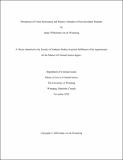| dc.contributor.author | van de Weetering, Jantje Wilhelmina | |
| dc.date.accessioned | 2020-12-11T21:48:47Z | |
| dc.date.available | 2020-12-11T21:48:47Z | |
| dc.date.issued | 2020-11 | |
| dc.identifier.citation | Van de Weetering, Jantje Wilhelmina. Perceptions of Crime Seriousness and Punitive Attitudes in Post-Secondary Students; A Thesis submitted to the Faculty of Graduate Studies in partial fulfillment of the requirements for the Master of Criminal Justice degree, Department of Criminal Justice. Winnipeg, Manitoba, Canada: The University of Winnipeg, November 2020. DOI: 10.36939/ir.202012111543. | en_US |
| dc.identifier.uri | https://hdl.handle.net/10680/1870 | |
| dc.description.abstract | Public perceptions of crime seriousness and attitudes towards the punishment of crime stem from the social norms and values that shape society and are informed by ways of knowing about crime. Located within a social constructionist paradigm, the purpose of this study was to examine the influence of post-secondary education, crime type and crime representation on perceptions of crime severity and punitive attitudes for different crime types. A sample of 971 students from the University of Winnipeg completed an online questionnaire measuring perceptions of crime severity for one-line crime descriptions as well as crime scenarios based on actual court data. Results show that both wrongfulness and harmfulness are strong predictors of perceived seriousness. As predicted, violent crimes ranked highest on measures of seriousness, wrongfulness, and harmfulness, and received the most severe sentencing recommendations. While the level of education completed had no significant difference on perceptions of crime severity, differences between fields of study showed significance. Comparisons between responses to the one-line crime descriptions and the crime scenarios revealed significantly stronger severity ratings for the scenarios than for the one-line descriptions although the ranking of crimes remained similar. Findings suggest that universal notions of wrongfulness and harmfulness exist that influence perceptions of seriousness and are resistant to change. Perceptions towards crimes are informed by a socially constructed reality of crime that shapes our knowledge of crime. Understanding the underlying factors that influence perceptions and attitudes towards crime may shed new light on the social approaches to dealing with crime and provides new insights into crime control practices and government crime policy. Finally, results also emphasize the importance of reflecting on the matter of crime representation in academic research. | en_US |
| dc.description.sponsorship | Social Science Humanities Research Council (Scholarship) | en_US |
| dc.language.iso | en | en_US |
| dc.publisher | University of Winnipeg | en_US |
| dc.rights | info:eu-repo/semantics/openAccess | en_US |
| dc.subject | Offence severity | en_US |
| dc.subject | Crime seriousness | en_US |
| dc.subject | Student survey | en_US |
| dc.subject | Punitivity | en_US |
| dc.title | Perceptions of Crime Seriousness and Punitive Attitudes in Post-Secondary Students | en_US |
| dc.type | Thesis | en_US |
| dc.description.degree | Master of Arts in Criminal Justice | en_US |
| dc.publisher.grantor | University of Winnipeg | en_US |
| dc.identifier.doi | 10.36939/ir.202012111543 | en_US |
| thesis.degree.discipline | Criminal Justice | |
| thesis.degree.level | masters | |
| thesis.degree.name | Master of Arts in Criminal Justice | |
| thesis.degree.grantor | University of Winnipeg | |

